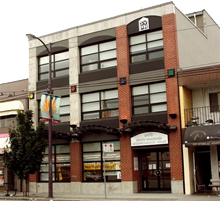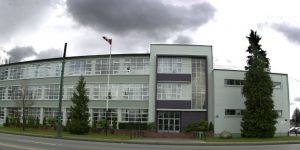Welcome, future CAP student!
Hi, I’m Selena and by the time you read this, I will be a former CAP Global Citizens student.
If you’re looking at this blog, it must mean that you’ve already made the great decision of joining CAP! Now that you’ve made that great choice, I’d like to help you make another!
**Italicized words in bold in this blog are terms and concepts you will be learning in your upcoming SOCI 100 class with Dr. Greer.
Why choose Trek over discussion section?
When Dr. Greer first introduced the Trek option to us, I was honestly reluctant to consider the idea. I wanted to join a discussion section because I was scared that if I didn’t, I would miss out on a chance to develop my scholarly writing skills with the papers that come with it and that I would also miss out on reinforced explanations of class concepts. However, not only did I find that my other classes gave me plenty of practice with how to write papers, but I found that with Trek, I was able to not only understand the sociological concepts learned in class, but to use and apply them to real life situations. For me, a hands-on experience equipped with a critical eye helped broaden my view on society and helped me better understand the class content.
Other reasons to join Trek:
- It’s a chance to get off campus!
- If you’d like to get engaged in the Vancouver community but are uncertain or nervous, this is the perfect introduction and stepping stone for a way into it.
- It’s great experience that can lead to weak ties that can help with future job connections and references.
- It means that when your classmates are stressing about their soci paper, you’ll be off having fun in the community instead! 😉
- A helping hand is always needed and appreciated.
My Trek experience:
My Placement

The SVNH from street view on Victoria Dr. (from Google Images)
I volunteered for the South Vancouver Neighbourhood House (SVNH). My role was being a tutor for one of their youth programs for newcomers to Canada, The Newcomer Learning Club. This year, a youth settlement counselor ran the club after school on Fridays at John Oliver Secondary. Every week I would come to the classroom and hang out with a small group of kids, chat with them and help them with their homework for an hour and a half.

John Oliver Secondary from street view (from Google Images)
I was drawn to the idea of this program because my father was a refugee from the Vietnam War and has told me how much him and his family had appreciated the help that the community had given them when they first arrived to Canada. This lead me to want to be part of the support system that exists for new immigrants and refugees in our country.
Who are these kids? / Why do they need help?
The kids that attend this afterschool program are either refugees or simply kids who have recently moved to Canada. Newcomers face a lot of struggle, as moving countries is not an easy transition. Newcomer children in specific are very vulnerable since they are at the time in their lives where they are trying to discover and build their identities while also facing discrimination against their race, gender, culture and class. On top if this, their self-confidences are further hindered as they do not know English very well and they lack knowledge of their new environment.
The Learning Club program is available for all kids in the high school, however the common ages are thirteen to fourteen. In the program there were a few Syrian refugees, a girl from Guatemala, a boy from Zambia, a girl from Vietnam and a boy from Pakistan. However, I noticed that the majority of the kids who showed up to Learning Club were kids from the Philippines whose mothers were caretakers and left them when they were young to come to Canada. Now that these kids are about thirteen, they have come to join their mothers. These kids struggle adjusting to their home lives because oftentimes, with this time apart, their mothers have found new husbands and now have had other children. For the newcomers, this can affect them deeply when they come to this country as they now live with a mother they have not seen in ten years and in a completely new family and environment. What was fortunate, however, was that when I first told about the Filipino kids’ situation by the program director, I immediately understood the situation since I had already learned about why Filipino mothers would come to Canada as caretakers from the sociology lecture and reading in past weeks.
Significant aspects of my experience / How are we helping?
The first day that I came into the classroom, I had a conversation with some of the students that really stood out to me. I was talking to one of the girls and I asked her which country she had moved from. She was a very outgoing girl and carried herself as though she were confident and collected. I could tell there was major impression management going on here because when she replied, she said “Vietnam”, but her body language suggested that she was incredibly insecure about this. I replied with, “Oh, my dad is from Vietnam”. Her and the kids listening in were shocked. They asked me about my mom because they told me I didn’t look Vietnamese. I said that she was white and they replied, “Oh, so you mean Canadian”. I was taken back for a moment, but then replied, “Being Canadian does not mean you have to be white. You can be coloured and still be Canadian”. The kids all gave me puzzled looks and slowly retreated back to their activities. I was shocked. The fact that these kids were associating a Canadian identity synonymously with being white was very concerning. This showed me that a large part of the insecurity these kids feel is due to not seeing themselves as Canadian and thus “out of place” in the community.
When I initially signed up for this volunteering opportunity, I believed that the goal of this program was to provide newcomer kids with help for their homework and to teach them English skills. I was very wrong—it is so much more. The manifest function of Learning Club is to help these kids with their homework. However, the latent function is to help these kids socially integrate and feel as though they belong as Canadian citizens in their new environment and community. This said, it is not really about the homework—One of the functions is teaching these kids to resist the internalized oppression they have against themselves that prevents them from feeling “Canadian” simply because they are coloured. Moreover, this program is about developing a sense of belonging, confidence and social skills in a safe environment that will gear them for their new life.
In essence, the goal of this program is to work to improve the factors that contribute to these kids’ social determinants of health for the sake of their well-being in this country. Furthermore, simply being exposed to me as a UBC student builds these kids’ cultural capital. Since I have gotten to know these kids and have built strong ties with them, through reciprocity of exchange, we have established a development of common ground. With this, the kids have begun to see that I am just like them and are starting to understand that where I am in the community is absolutely where they can be too. Moreover, from the program encouraging these kids to do volunteer work in the community, teaching them social norms, teaching them their rights and how to ensure these, and building confidence, they have gained vital building blocks to their cultural capital, which, in the end, will meet the goal of the program and improve their overall life chances.
Concluding Remarks / Tips for you!
Overall, I had an amazing experience with Trek and I highly recommend that you consider it. I assure you that your SOCI 100 experience will be enriched with all the connections you will make to class content and that you will have a lot more fun than those in discussion section writing papers! 😉
Before I end off, I have a few tips for you:
- If you are debating Trek because of the time commitment, I would suggest signing up for a Friday time slot like I did because you won’t have to worry about finishing assignments or studying for a test the next day while you’re spending your time at your placement.
- If you’re nervous about it, take the risk! University is not all about the classroom setting. Getting out there and getting experience is vital in enriching your skill sets to go along with your degree.
- If you make the awesome decision of choosing Trek, but you’re not sure how you would get kids or whoever you’re working with to listen to you and respect your position, just listen in class and you’ll learn about ways you can define the situation to your advantage.
I hope this blog provided you with some of the information you were looking for!
Thanks for taking your time to read this blog and I wish you the best in your upcoming first-year experience!
